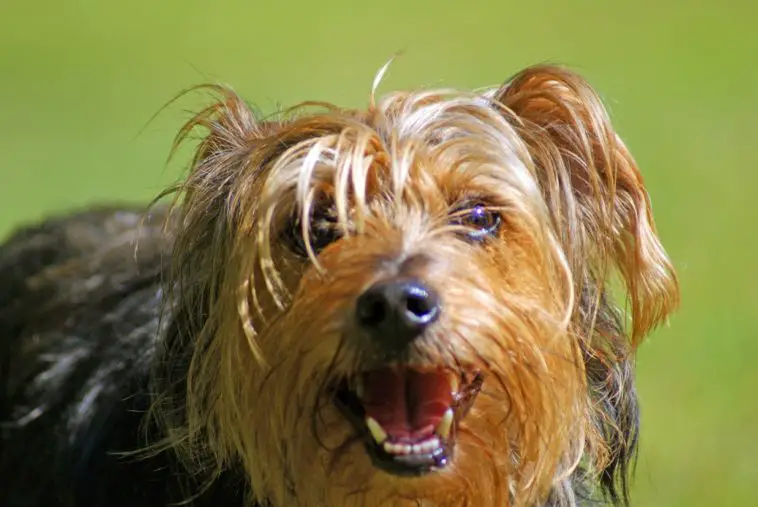When do Yorkies stop teething?
Like all pups, Yorkie puppies also go through an intense teething and biting phase.
It can be incredibly painful for you and your family members, but with proper bite inhibition training, you can control it.
Most Yorkies develop all of their adult teeth by the time they are between 6 and 8 months of age.
This is also the time you must teach it bite control and inhibition.
In this article, we will discuss:
- When do Yorkies stop teething
- Week by week changes in your Yorkie puppy’s teeth
- Why are a Yorkie puppy’s teeth so sharp?
- How to handle Yorkie pup’s teething – tips for bite inhibition training
- What to do if your Yorkie continues to bite
- How to take care of Yorkie’s teeth?
- FAQs
Also Read: When Do Yorkies Stop Growing
When Do Yorkies Stop Teething

We understand completely how difficult your Yorkie’s teething phase can be.
You are probably getting bitten on your toes and your furniture and walls are also bearing the brunt of it.
And that is why you are so keen to know the answer to the question – when do Yorkies stop teething?
Like all puppies, it can be a good 6 to 8 months before all of your Yorkie’s adult-teeth will be in. Once the permanent tooth starts to come out, your puppy will feel some pain.
This is also the time your pet should learn bite inhibition and understand that it is not right to bite people and furniture.
The key is to guide your pet throughout this phase.
You must teach your Yorkie puppy – beginning from its first teeth to its last – to not bite an assortment of items other than the teething rings and chew bones you provide.
Puppy teething toys are helpful during this time too! You can have your pup try on some soft toys.
Let us first understand a Yorkie’s week-by-week progression of teeth development, so you’d know what to expect:
Week By Week Changes in your Yorkie Puppy’s Teeth
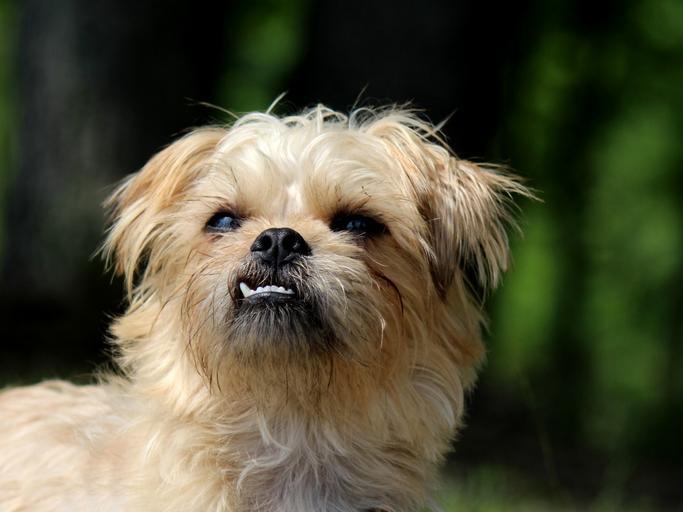
At birth
At birth, your pet will not have any puppy tooth.
This is when it will nurse constantly – so it is best to keep the puppy with its dam up to 8 weeks.
From 2 weeks to 4 weeks
At this point, your breeder should ideally take your Yorkie puppy and its littermates to the vet for their initial vaccination and deworming.
This is the time the vet will check their teeth too. Between week 2 and week 4, puppies develop narrow-edged teeth – the incisors.
Your Yorkie will have 6 incisors each on the top and lower jaws.
Between 3 and 6 weeks
At this age, your Yorkie pup will develop its premolars and molars. There are three at the top and bottom jaws.
At 4 weeks
At this point, the canines will appear.
These are the sharp pointed teeth in the front between the incisors and the pre-molars. Your Yorkie will have four canines, two on the top, two on the bottom on the left and right sides.
Between 5 and 8 weeks
During this period, the last of the molars will develop. Also, the permanent or adult teeth will start pushing out the baby teeth or the deciduous teeth.
It is very important that all of the baby or non-permanent milk teeth fall off. Otherwise, your vet should extract them.
Failure to do so will lead to over-crowding of teeth which, in turn, could affect the development of the permanent teeth.
Crowding of baby and permanent teeth can also cause difficulty or pain while eating. It is also one of the factors that contribute to canine periodontal disease.
By week 8, your puppy should have all of its 28 baby teeth. This is a good time to start feeding it high-quality kibble or semi-moist food.
Check out our guide on Best Food for Yorkie Puppy
Between weeks 12 and 16
At this stage, your fur-baby’s baby teeth will start falling off. This process is quite painful and your Yorkie will want to chew and bite on everything it sees.
It is very important that you provide teething rings, chew toys, etc. to your puppy to satisfy its chewing instincts and also soothe the irritated gums.
Here are some great items to consider when your Yorkie puppy is teething:
- No products found.
- Puppy Teething Rings
- Teething treats
This is also a good time to start brushing your pet’s mouth. The earlier you start, the sooner your Yorkie will get used to dental cleaning.
6 to 8 months
By now, all of your Yorkie’s adult teeth should be in.
If baby teeth are remaining, have your vet examine and remove them. In addition to replacing the 28 baby teeth tooth for tooth, your Yorkie will also develop 14 more teeth – 4 premolars and 10 molars.
Thus, in total, your Yorkie will have 42 adult teeth by the time it is 7 to 8 months old.
Here is a summary to show you Yorkie’s teeth development
| Yorkie’s Age | Teeth |
| Birth to 2 weeks | No teeth |
| 2 to 4 weeks | Incisors develop followed by pre-molars, molars, and canines |
| 5 to 8 weeks | All baby teeth will be in (28 of them). By 8 weeks, milk teeth will start falling out |
| 12 to 16 weeks | Adult teeth push out the baby teeth. This is a painful phase, so provide some teething rings, chew toys, etc. |
| 6 months + | All 42 permanent teeth should be in. |
Why are My Yorkie Puppy’s Baby Teeth so Sharp?
All puppies have very sharp teeth and you will experience that a lot during the time period from 8 to 16 weeks.
At this point, your Yorkie will experiment in biting everything that comes in its way. The sharp teeth help your pet test out different textures and also inform it about ‘what is and isn’t alive’.
For pet parents that are new to dog ownership, this can come as quite a surprise.
Yes, your Yorkie is bound to have very sharp teeth but this is the time to teach it bite inhibition.
Read on for important tips about this important aspect of Yorkie’s training.
How to Handle Your Yorkie Pup’s Teething – Tips for Bite Inhibition Training
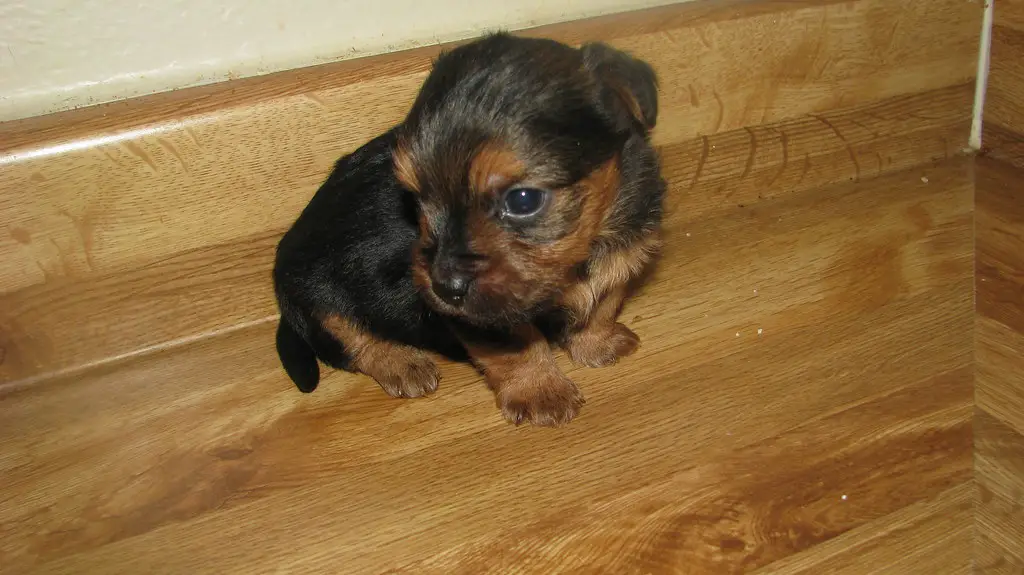
All puppies bite at the time of teething. In fact, if you have observed your Yorkie puppy with its littermates, then you might have watched it playfully nip its siblings.
Instead of getting angry or shouting at or hitting your pet, you must use bite inhibition training.
Bite inhibition training will help you teach your Yorkie to use its ‘soft mouth’ and also teach it what is and isn’t acceptable to bite.
Many canine behaviorists and vets lay a lot of stress on bite inhibition training. Many even go as far as to call it the most important aspect of puppy training.
Also Read: Are Yorkies Easy to Train
What is Bite Inhibition?
Explained simply, bite inhibition teaches your Yorkie to control the force of its bite.
Without this training, even a simple grab of your shirt’s sleeve while playing could end up ripping it apart, turning playtime into an upsetting time.
Likewise, without bite inhibition, your pet might – in self-defense – bite you or your family member if you accidentally step on its tail.
When your puppy is with its dam and littermates, it automatically learns about bite inhibition from the parents.
But once your pet is with you, you need to take on the role of the teacher.
Through good bite inhibition training, even if your Yorkie gets provoked (knowingly or unknowingly), it will politely place its mouth on your skin in a ‘Please-don’t do that’ warning.
How to Go about Bite Inhibition Training
Your Yorkie needs to know that biting hurts. This means that, each and every time it bites you, your clothes, or your slippers, you MUST:
- Yell OUCH! Loudly
- Ignore your puppy by turning your back on it for at least 30 seconds before resuming play
- Repeat the ‘OUCH!’ each and every time your Yorkie nips you.
- Make sure your family members (especially children) use these steps too.
- Do not make the action fun – teach kids not to squeal or laugh when you are training bite inhibition. Take bite inhibition very seriously.
- Even during play time, when your puppy nips you accidentally or purposefully, immediately say NO or Stop it, and place it in its crate. Then leave the room for at least 30 seconds. Teach your kids to follow this too.
- Be very consistent. Your Yorkie will need several repetitions of this process until it can understand that biting is strictly out of bounds.
What to Do if Your Yorkie Puppy Continues to Bite?
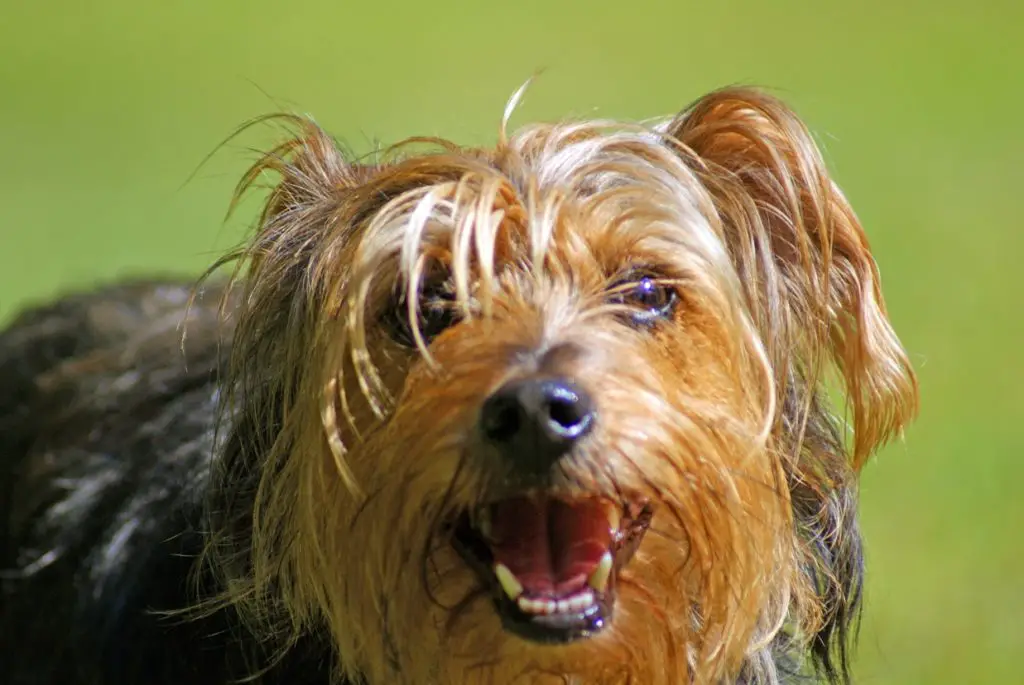
Here are some more tips that can come in handy when training your Yorkie about bite inhibition:
Examine its diet
Make sure that your Yorkie is getting all the nutrition it needs. Examine its diet and, if needed, discuss it with a vet or your breeder.
Offer it a chew toy
Soak your pet’s rope toy or chew toy in some chicken broth and freeze it. Offer this to your Yorkie when it feels the urge to bite and chew.
The cooling broth will soothe its sore gums and teeth. It will also teach your Yorkie that it is okay to bite the toy but not okay to bite people or furniture.
Hand-feed your Yorkie
We are not referring to table scraps here!
Hand feed your Yorkie its kibble and treats.
You can also ask your visitors and kids to hand feed it (if they are okay doing that!) as this will teach your puppy to be gentle on your hands.
Every time it uses force to bite or grab the food, say a firm No and re-offer the food until it is able to gently take it off your hands.
How to Take Care of your Yorkie’s Teeth?
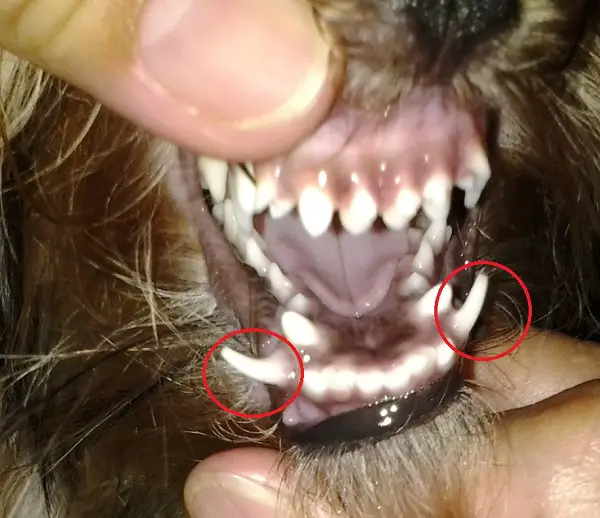
Dental health is often a weak point in many toy breeds and the Yorkshire terrier is no different. That is why, dental cleaning should start right from puppyhood.
Examine your puppy’s mouth
Make sure all its baby teeth have come off. Bring any problems to your vet’s attention right away. Get retained teeth extracted as they could cause many health issues later.
Schedule oral exams
Have your vet examine your Yorkie’s teeth during each booster shot. In case your Yorkie is on wet or canned food, it will need at least two dental scaling sessions per year.
Also Read: Yorkie Vaccine Schedule
Feed it a nutritionally balanced diet
Feed your pet a high-quality kibble based on its age.
Avoid feeding table scraps and limit the intake of soft foods. Provide your pet with dental treats from time to time.
Also read: Are Dentastix Good for Dogs
Teach your dog to have its teeth brushed
Begin dental cleaning from your Yorkie’s puppyhood.
Use a good toothbrush and toothpaste set for cleaning your pet’s teeth at least 2-3 times a week.
You can also use dental water additives (after checking with your vet).
If you love your Yorkie, you must take its oral hygiene very seriously!
FAQs on When Do Yorkies Stop Teething
1. How long will my Yorkie’s teething last?
Yorkie teething phase can be intense and painful for you, but don’t worry, it will be over by the time your Yorkie is between 6 and 8 months old.
Use the bite inhibition training tips to teach your Yorkie to ‘mouth gently’.
2. Is there a puppy teething gel?
It is best to check with your vet about acceptable puppy teething gel or puppy teething oils safe for your pet.
3. Do Yorkies cry while teething?
Yes, your Yorkie puppy might cry or whine while eating or chewing on its chew toys. This is because its gums are very sensitive and irritated.
As long as the whining is not excessive and there are no other signs of pain, you should not be overly concerned.
4. What else can I offer my teething Yorkie?
You can offer cold (not frozen) carrots, frozen fruit bits like strawberry and bananas, wet dish towel soaked in chicken broth and chilled in the refrigerator, and puppy dental treats .
These will soothe its gums and relieve pain to some extent.
Conclusion – When Do Yorkies Stop Teething
When do Yorkies stop teething?
Your Yorkie will stop teething by the time it is 6 to 8 months of age.
Your Yorkshire terrier puppy can be irritable and uneasy when his adult tooth starts coming out. You will easily recognize these puppy teething symptoms so it is vital to aid your puppy to lessen the discomfort.
Make sure you teach your puppy bite inhibition and also provide it with the right dental chews and toys to soothe those irritated gums.
The teething process is a hard time for your teething puppy. And as a pet parent, it’s beneficial that we put our best effort to help ease their pain.
Practicing good dental hygiene will make your Yorkie free from gum disease or periodontal diseases. A healthy dog’s mouth is the key to your puppy’s better and longer lifespan too. It also saves you time and money for costly veterinarian treatments.
Brush your Yorkie’s teeth regularly, use dental water additives, and schedule regular vet checkups to keep your Yorkie’s teeth in good condition.
